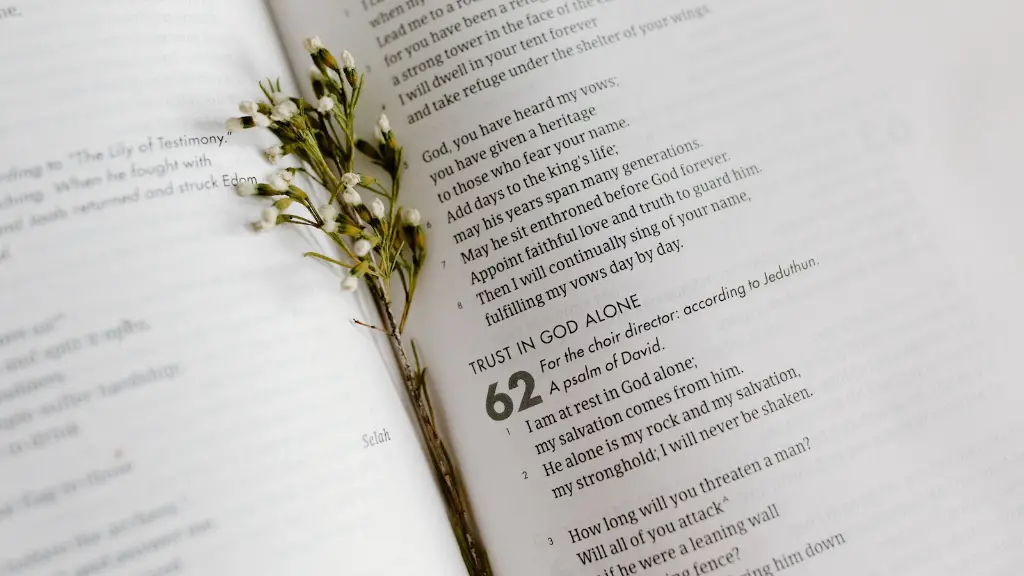Restoration in the Bible is an important component of Christianity, with passages in both the Old Testament and New Testament dealing directly with the deepening of the spiritual life, hope for reconciliation and a reminder of a shared purpose. It’s a term used to refer to the work of God in humanity — the redemptive power of his promise to restore life to its original state. Restoration usually takes two forms in the Bible:
Firstly, there is literal restoration, which means the physical bringing back of something that has been lost or taken away. The Bible often speaks of God restoring physical health and financial stability to his people. In the Old Testament, God healed the lame, the blind, and the sick, while in the New Testament, Jesus preached restoration of the soul. In both cases, God’s act of restoring his people to a place of health and strength had tangible results.
Secondly, there is spiritual restoration, in which God’s healing of the soul is in view. This type of restoration isn’t always tangible and doesn’t always have immediate results. Rather, God’s work is seen coming to fruition in the long term, as his grace and love come to bear in the life of one individual or a group of people. Spiritual restoration is not about changing outward behaviors, but rather about strengthening the inner life and reconnecting with God’s love. In some cases, this process can take years or even decades.
The Bible is full of passages that discuss the power of restoration. In most cases, these passages are associated with the acts of God that brought his people back to their intended relationship with him. Examples of restoration in the Bible include the return of the Israelites to their land after their exile in Babylon, the deliverance of Joseph from slavery, and the healing of David’s soul as he repents of his sin. In each instance, God is actively involved in restoring his people to a place of wholeness and blessing. The Bible also speaks of the restoration that comes through Jesus’ death, which brings us into a permanent relationship with the Father.
While the focus in the Bible is often on physical and spiritual restoration, there is an important sense in which restoration is also a unifying concept. Through restoration, the Bible teaches us that whatever our circumstances, we are all connected and on a shared journey towards finding our true home: with God. Through Jesus, we learn that God’s grace and love are not only capable of restoring us to himself, but are strong enough to bring us back to each other. In the same way that God restored his people to himself, he also calls us to restore one another. This can take many forms in the way that we interact with and treat those who are different from us.
Restoration in the Bible is an incredible reminder of God’s boundless mercy and unceasing love. It is a call to put our trust in his promises, remembering that his grace and goodness can ultimately restore what has been lost. Through restoration, we can draw closer to God and discover the peace, joy and purpose he desires for us.
What are the Effects of Restoration?
Getting restored in the Bible carries a number of effects that can be seen in both the micro and macro levels. Restoring our relationship with God often brings about a transformation in our lives, allowing for a deepened faith and a more intentional service. On a micro level, those who have experienced God’s grace may experience a sense of joy and peace, often coupled with a renewed trust in the Lord. On a communal level, a restoration experience can have a tremendous impact on communities, resulting in a renewed sense of hope and unity.
The effects of restoration also extend to our relationship with others. The Bible speaks about restoring relationships and forgiveness as essential ingredients to peacemaking and right living. Drawing closer to the Lord encourages us to interact and serve others with agape love, humility and respect. It has been said that when one person experiences a personal restoration, the entire community can benefit. In these ways, restoration may lead us to become more selfless and outwardly focused, allowing God’s love to permeate our lives.
Moreover, the experience of restoration provides us with hope for the future. When we consider all the brokenness in the world, it can be hard to feel optimistic about the future. But hope for the future can be found in God’s ability to restore and redeem. The Bible is full of stories of God restoring his people in the midst of difficult circumstances, reminding us that he is ever-faithful and that no injustice is beyond his ability to restore.
Therefore, when believers contemplate restoration in the Bible, they can take comfort in the knowledge that God’s loving mercy is ever-present and powerful. Ultimately, when we look to the Lord for our restoration, he will provide us with a fresh start and a bright future.
What Does Restoration in the Bible Mean for the Church?
In the Bible, God is often portrayed as the “restorer of Israel.” This emphasizes God’s faithfulness and initiative in restoring his people to their original purpose and calling. Similarly, restoration in the Christian context means that Jesus Christ, through his death and resurrection, continues to bring about a spiritual rebirth in believers. The church embraces the process of restoration and points to the power of Jesus’ sacrifice to restore God’s glory and holiness to us.
For the Christian, this means that once we accept Jesus as our Savior, we are immediately restored to relationship with God and welcomed into a family of believers. As we strive to follow His will and teachings, we are able to live out our faith more deeply with each passing year. This transformation is not always visible to the naked eye, but it is a process of internal restoration—learning the ways and will of God, and living more in line with the truth of scripture and the life of Jesus.
Furthermore, in seeing our lives restored through Jesus, we are inspired to help bring restoration to others. As we seek to imitate the loving mercy of Christ, we are called to seek out those who are vulnerable or broken and help to bring them back to God’s love and care. We can also support those who are in need of practical support, such as food and shelter, in addition to offering prayer, guidance and hope for a better future.
Through our acts of restoration, we can learn to reflect the love of God and help restore the relationship between humans and Him. In doing so, we are enabled to become people of transformation and renewal, living out the Gospel message in a way that reflects God’s goodness and mercy.
How Can I Experience Restoration?
The restoration that comes with following Jesus is a beautiful and powerful process. To experience this restoration, the first step is repentance—the active act of turning away from our old life and sins, and turning towards Jesus’ grace and mercy. As we pursue this transformation, we must continually focus on growing in our faith, keeping our faith and trust in the Lord, and reflecting His love and compassion in our actions.
It is also important to remember that restoration is an ongoing process. The work of the Lord in our lives is never completed. Rather, it is a process of continual learning and growth. As a result, if we truly want to experience restoration, we must be willing to take consistent steps to draw closer to the Lord and to other people. It is only when we are humble and willing to be changed that we can truly experience the hope, joy, and renewal that comes with being restored in the Lord.
Additionally, the Bible teaches us that restoration is often the product of remaining fixed on Jesus and his teachings. This means that time spent in prayer and Bible study is essential for understanding and experiencing God’s love and grace. Furthermore, when things get tough, it is important to remember that God is ever-present and always working to restore us to a place of blessing and joy.
Restoration in the Bible is a beautiful reflection of the Lord’s love and power. As believers, the Lord calls us not only to experience this restoration in our own lives, but to bring it to the lives of others. Through restoration, the Lord seeks to bring us closer to him and to each other. He seeks to renew our relationship with Him, while reminding us that He will use his love and power to forgive our sins and restore us to relationship with him.
What are the Signs of Restoration?
The signs of restoration in the Bible are numerous. When we experience God’s grace and renewal, we often feel a sense of joy and peace, contentment in our circumstances, and a spirit of generosity towards others. On a practical level, we might recognize changes in our behaviors, habits, and relationships. These signs of restoration do not necessarily mean that our circumstances have changed, but they can help us recognize that we are indeed being restored and draw closer to God and the fullness of life he offers.
On a spiritual level, the signs of restoration are often connected to our relationship with God. When we experience a personal spiritual revelation or a Holy Spirit-infused moment, we may gain insight that encourages spiritual growth and enables deeper faith. The Holy Spirit may also work to heal, comfort and restore our brokenness. He can show us a clearer understanding of God’s plan for our lives, or help us to forgive ourselves and others or to live with conviction and joy.
Furthermore, we can observe the signs of restoration in our relationships. When relationships are restored, we often notice a newfound level of trust and respect. The individuals involved may be more willing to forgive and reconcile, which is a sign that their relationship is growing stronger and that the Lord is at work. We may observe similar signs of restoration in our communities, such as increased unity and mutual understanding.
As such, the signs of restoration in the Bible are numerous and varied. As we look to the Lord in prayer and study of the Scriptures, we can oftentimes observe how he is restoring us and making us whole. The Lord’s power and grace are at work in our lives to bring about redemption and a better future. Therefore, we can trust that no matter the circumstances, His restoration is always available and that He will lead us through the process of becoming whole and complete in Him.





